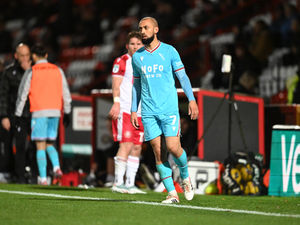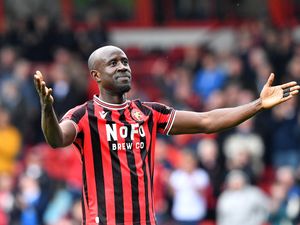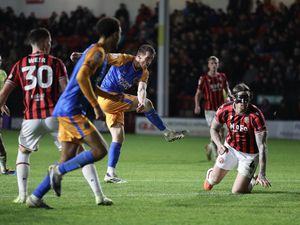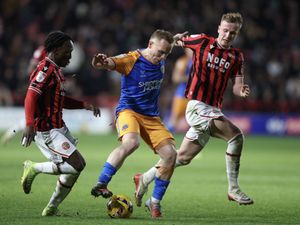The Big Interview: Dean Smith
Fitting really, that one of the proudest moments in Walsall manager Dean Smith's football career should arrive in a competition sponsored by a paint company.
After all, it's the same industry where the Saddlers boss began his working life back in the late 1980s.
Out of school and seemingly out of luck when it came to getting a break in football, teenage Smith needed a job. He soon found one.
He said: "I got a job with my dad's friend in a powder paint company, down in Aston.
"I was only there a couple of months and it probably helped my fitness, because I used to cycle there and back!
"It was shift work and I think it taught me you have to work hard to get anything in this life.
"What were my plans if I hadn't become a footballer? I don't know, to be honest. I had a job, so I guess I would have stayed there and seen where it took me, I guess."
There are more than 29,000 Walsall supporters making their way to Wembley today, delighted Smith did make it in football. His big chance, of course, came at their club.
He recalls: "I'd had a couple of failed trials before I went to one at Walsall. I remember there being dozens of kids there.
"I fancied myself as a midfielder but Stan Jones, who was in charge of the reserves, said 'no, you can play centre-half.' "By the following Saturday, I was playing for the youth team at Port Vale away.
"The next thing you know I was being offered a scholarship, it was that quick. I remember it well, because I went from earning £19 a week to £27.50!"
It was the start of a near three-decade journey which would take Smith from Walsall and back via Hereford, Sheffield Wednesday, Port Vale and Leyton Orient, twice.
And it was also a dream come true for the lad who had desired little else than being a footballer, while growing up in Great Barr.
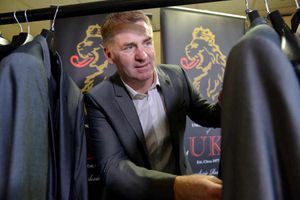
He said: "It was football, always football from a young age.I was always out playing with my brother and his mates.
"I think one of the things which helped me is my brother being two-and-a-half years older, so I was always playing against him, playing against older kids all the time.
"We had a school behind us – Gorse Farm – so it was always a case of climbing over the fence and having a game there."
The first glimpse of the professional game for the Smith brothers would come at Villa Park, where their dad worked as a steward.
Smith said: "He was there for 25 years, Trinity Road, the old stand. We used to have to go there every Saturday and have to clean the seats, before watching the game after.
"We used to get a pie and an orange and go and watch the game for free!"
Smith had potential as a player, no question. At one stage, he was on the books of Newcastle United as a schoolboy and used to make the long journey up to the North-East during the holidays.
He said: "Mom and Dad used to stick me on the train and see me of. Someone from Newcastle would meet me there and put me up in digs in Whitley Bay. I was 15.
"It was really enjoyable and I suppose helps you grow up really quickly. But it shows how trusting my parents were of me as well.
"I remember meeting some friends on holiday one year at 16 and being invited to go to a Celtic-Rangers game. Mum and dad let me go up on the coach to that too."
Any chance of making it at Newcastle ended when the Tyneside club decided to focus on players based in the North-East.
Their loss became Walsall's gain, as Smith went from being an apprentice to a first-team player in 18 months, never missing a step along the way.
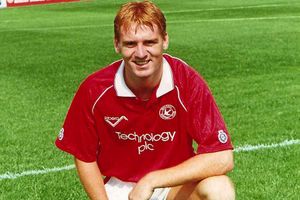
He said: "I learned a lot just being an apprentice at Walsall, there was a great camaraderie.
"Tommy Coakley was the manager and the first season I was there they got promoted through the play-offs into what was then Division Two.
"There was a big high at the club at the time and the whole town was behind it. I was an apprentice, cleaning David Kelly and Craig Shakespeare's boots.
"I remember going to watch them play Bristol City in the final, us winning 3-1 there and thinking that was it, we were promoted. Then we got beat 2-0 at home in the second leg.
"We ended up winning the replay and it was a great party on the night. The following season was a tough season one but I managed to make my debut, at 17.
"Sunderland away, I remember it still like it was yesterday. To go there and win 3-0 on the day was brilliant."
Smith would go on to make 142 appearances in a seven-year stay with the Saddlers, which was cut short sooner than he wanted.
That said, his £75,000 move to Hereford in the summer of 1994 was something of a necessity.
Smith smiled: "The chairman still references it to this day. He always tells me, 'selling you helped save the club!' I think I am still Hereford's record ever transfer fee.
"I remember the conversation, (manager) Kenny Hibbitt phoned me up and told me there is a chance to go but I told him no, I don't want to leave.
"I was happy at Walsall, I was captain of the club, living at home. Then I went to speak to Hereford and they offered me an unbelievable deal.
"But I was still umming and ahing before I sat down with Jeff and Barry Blower and it was almost a case of, if you don't go, the club could go bust."
Smith would spend three years at Edgar Street before making his next move, this time to Leyton Orient and the bright lights of London.
Soon, he and wife Nicola discovered they would have to get used to a very different way of life in the capital.
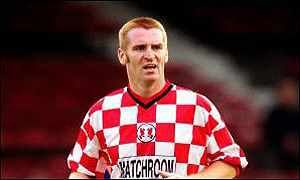
He said: "It was certainly an eye-opener. It took us six months to get to know the neighbours. In Birmingham you are knocking on your neighbour's door all the time up here.
"You walk down the road in London and say hello to someone and instead of saying it back they'll look at you strangely. It is a quicker pace of life but you get used to it.
"We really enjoyed it, we settled into it and I had six wonderful years at Orient as a player, a really good club with really good people."
Smith and his family would return to London and Orient when, after stints with Sheffield Wednesday and Port Vale, he decided to accept an offer from Martin Ling to become youth-team coach.
He said: "Martin kept telling me my legs had gone, that I ought to quit.
"I always wanted to play as long as I could, that was my dream but I came to the conclusion I could keep chasing contracts, or get on the rung of the coaching ladder.
"I decided to go with the latter and it is the best decision I ever made."
Smith would spend just six months as youth-team coach before being promoted to Ling's assistant.
Shortly after, in 2006, Orient won promotion back to the third tier for the first time in more than a decade but in January 2009 came a definite low point for Smith. He and Ling were sacked.
He said: "It went down as mutual consent but I never consented to anything. I didn't consent to me not doing my job to the best of my ability. I still thought I was."
It was an experience which would change his outlook, saying: "Anyone who has been sacked in football will tell you the same, it is like a death in the family.
"For a week or two you don't know what to do, or what has hit you. Certainly, it is a rude awakening.
"The first person I called, or should I say second after my wife, was Adam Chambers because he was a player at Orient a the time.
"It happens and things happen for a reason, I have always believed that.
"It is a strange situation because when you have been a No 2 to somebody for four or five years, you kind of lose your own identity.
"You are then waiting for them to get a job for you to get a job. I wanted to branch out and had been looking. Fortunately the Walsall job came up."
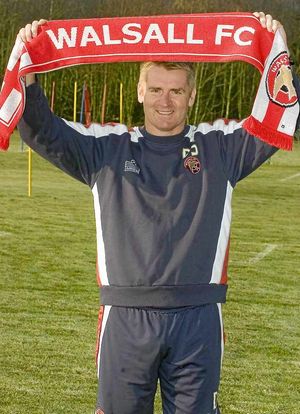
That job was head of youth development at the Saddlers.
It became Smith's in 2009 and marked his return to the Midlands some 15 years after his exit as a player.
Just 18 months later, with the team nine points adrift of safety at the foot of League One, manager Chris Hutchings and assistant Martin O'Connor were sacked. Smith was asked to step up.
He said: "It came as no surprise to me when the chairman asked me to take over as caretaker, but I told him there and then I didn't want the job full-time," he says.
"Then I got into the hot seat and I suppose there was a moment when I really started enjoying it.
"To be honest, as soon as I was given the job on a caretaker basis, I treated it as though I had it.
"Otherwise, i think you are doing a disservice to it. I went and spoke to the players, told them it was a clean slate.
"I told them for now I'm the gaffer, in four weeks I might be back to Smudger – but, at the moment, I'm gaffer.
"We managed to stay up and to this day that is still my best achievement in football."
Sitting here now, in his office at Walsall's Essington training ground, it is difficult to imagine Smith not being a football manager.
It is a job he loves, but one which comes with pressures he will never allow to get the better of him.
He said: "Working with Martin helped me, seeing what he went through and what he has gone through since, with his well-documented depression.
"I was there to help him in any way I could with that, but I could see how doing this job could send you that way.
"There is a lot of pressure and stress if you let it in. I have been strict in not letting it in.
"Hence, we don't do Sundays. I think everyone needs a day off during the week to spend with the family and my staff more than anything else."
Time management, Smith believes, is imperative.
He said: "I remember, after two weeks in the job, I was driving from home to the training ground at half seven in the morning.
"I had made a phone call to an agent, I'd made a phone call to the chief executive and I was making another phone call to the secretary of another club about a loan player.
"I arrived and thought 'god, I've got to put a coaching session on now!' I remember thinking it was too much. Time management, I think, is the most important thing."
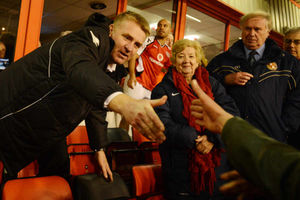
Nearly four years on from the Great Escape, Walsall bear the stamp of Smith's personality.
Players talk of a manager unlike no other they have worked with, who will go out of his way to solve a problem.
He said: "I'm a positive person and a happy person and I want that characterised around the dressing room, around the whole place.
"I think what helped me was working with the kids for 18 months.
"I was probably sterner as an assistant manager than I was as a manager, because I have learned you don't always get the responses you want.
"The one thing I said is that if I become a manager, I wanted to be the type of manager I would want to be managed by.
"I ask myself the question before I do anything, what would you have wanted as a player, as a person?
"I try to do it that way and I think you get more back from people by doing it that way."
Now, on the eve of Wembley, Smith is typically relaxed yet focused. For him and his players, this is no grand day out.
He said: "It will be a really proud day. In terms of achievement, I still say staying up that year was the biggest, but it will be an immensely proud day.
"I mean, 30,000 people going there is incredible, staggering.
"It struck home to me earlier this week when I went to the dentists in Aldridge with my daughter and I saw two cars go past with Walsall flags on the top.
"You only normally see those for England games. It was a great moment, just to see them. I thought, I'm part of what's helped do that."
Part of the reason, not the reason, is how Smith always always sees it. There is simply no chance of this Brummie getting too big for his boots.
He added: "I've always known where my roots are and what my values are. That has been ingrained in me from the start. I'm just a Great Barr kid."

